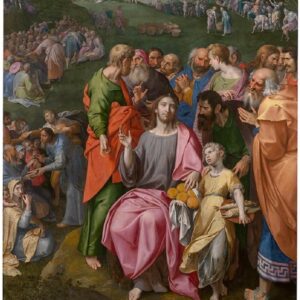 Although we are reading almost exclusively from St. Mark’s Gospel this year (Sunday after Sunday), the Church offers us a brief stretch during the summertime to visit the Gospel of St. John. Specifically, for five weeks, we will devote ourselves to St. John’s sixth chapter.
Although we are reading almost exclusively from St. Mark’s Gospel this year (Sunday after Sunday), the Church offers us a brief stretch during the summertime to visit the Gospel of St. John. Specifically, for five weeks, we will devote ourselves to St. John’s sixth chapter.
As we share the beginning of St. John’s sixth chapter this weekend (6, 1-15), note that Jesus did not feed 5,000 people with nothing. He started with something that was already available. And what Jesus did, the miracle He performed, was made possible because a little boy was willing to share what he had with others, including the many strangers around him.
Some erroneously say the “miracle” (or as St. John describes it, the “sign”) took place primarily because of the boy’s generosity; his willing to “give” resulted in many others generously sharing what they had brought with them that day. While the boy’s generosity is remarkable, there is no evidence that everybody else in attendance was moved to share what they had brought, thus providing the abundance of food. The logical conclusion of this thinking would be that Jesus’ miracle was simply a matter of breaking through the people’s self-centeredness. So much more, as we will see in the rest of John 6, is going on here!
Nonetheless, let’s admit that the Eucharist we are celebrating this weekend, is also about “giving,” about loving, and about sharing. The bread which will be offered by all is blessed at the consecration, then broken, divided, and given out to all. The Eucharist works best when we consciously celebrate it in this way and when it is genuinely a “sign” of what is going on in our daily lives – where God is constantly working miracles great and small.
There is another detail worth noting in John 6. This “feeding” miracle is the only miracle which appears in all four of the Gospels. In the other three Gospels, it is the disciples who are told to distribute the bread and fish among the people. That is a sign of their future mission to bring Christ to the world. But here, in St. John’s Gospel, it is Jesus Himself who distributes. St. John, as we will soon read in the rest of chapter 6, is going to record Jesus’ words about His being the Living Bread – who gives life to the world. Even though there are intermediaries, ministers, and collaborators, it is always Jesus Himself who comes to us in Word and Sacrament. St. John is emphasizing that Jesus is the source of all nourishment – spiritual and material. Take some time today (or during the week to come) to read all of John 6. Notice how “the table is set” for Jesus’ all-important teaching on the Eucharist by the episode here at the beginning of the chapter.
Let us pray. “Most Holy Jesus, we thank you and we praise you for giving us your most precious Body and Blood. Through your gift of the Eucharist, you nourish our bodies and souls. We thank you for having made yourself our food and for uniting us in your love. In your holy Name. Amen.”
Bonus reflection: “Whatever we have can bear fruit if we give it away—that is what Jesus wants to tell us—and it does not matter whether it is great or small. The Lord does great things with our littleness, as He did with the five loaves. He does not always work spectacular miracles and He never waves a magic wand; He works with simple things. God’s greatness is lowly, made up of love alone. And love can accomplish great things with little. The Eucharist teaches us this: for there we find God Himself contained in a piece of bread. Simple, essential, bread broken which is shared, the Eucharist we receive allows us to see things as God does. It inspires us to give ourselves to others. It is the antidote to the mindset that says: “Sorry, that is not my problem,” or: “I have no time, I can’t help you, it’s none of my business.” Or that looks the other way.”
Pope Francis

